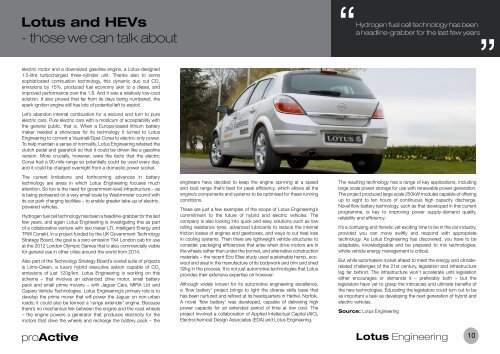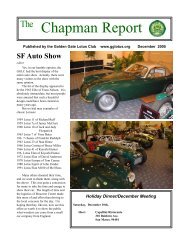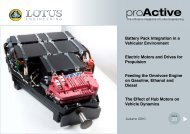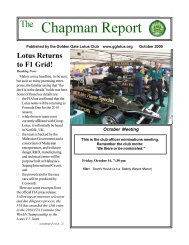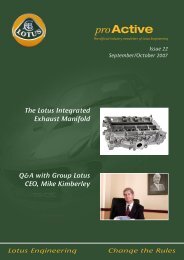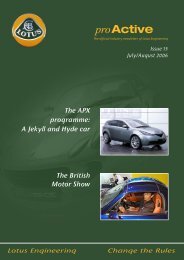Pro Active
Pro Active
Pro Active
You also want an ePaper? Increase the reach of your titles
YUMPU automatically turns print PDFs into web optimized ePapers that Google loves.
Lotus and HEVs<br />
- those we can talk about<br />
electric motor and a downsized gasoline engine, a Lotus-designed<br />
1.5-litre turbocharged three-cylinder unit. Thanks also to some<br />
sophisticated combustion technology, this dynamic duo cut CO 2<br />
emissions by 15%, produced fuel economy akin to a diesel, and<br />
improved performance over the 1.8. And it was a relatively low-cost<br />
solution. It also proved that far from its days being numbered, the<br />
spark ignition engine still has lots of potential left to exploit.<br />
Let’s abandon internal combustion for a second and turn to pure<br />
electric cars. Pure electric cars with a modicum of acceptability with<br />
the general public, that is. When a Europe-based lithium battery<br />
maker needed a showcase for its technology it turned to Lotus<br />
Engineering to convert a Vauxhall/Opel Corsa to electric-only power.<br />
To help maintain a sense of normality, Lotus Engineering retained the<br />
clutch pedal and gearstick so that it could be driven like a gasoline<br />
version. More crucially, however, were the facts that the electric<br />
Corsa had a 90-mile range so potentially could be used every day,<br />
and it could be charged overnight from a domestic power socket.<br />
The current limitations and forthcoming advances in battery<br />
technology are areas in which Lotus Engineering focuses much<br />
attention. So too is the need for government-level infrastructure – as<br />
is being pioneered on a very small scale by Westminster council with<br />
its car park charging facilities – to enable greater take-up of electricpowered<br />
vehicles.<br />
Hydrogen fuel cell technology has been a headline-grabber for the last<br />
few years, and again Lotus Engineering is investigating this as part<br />
of a collaborative venture with taxi maker LTI, Intelligent Energy and<br />
TRW Conekt. In a project funded by the UK Government Technology<br />
Strategy Board, the goal is a zero emission TX4 London cab for use<br />
at the 2012 London Olympic Games that is also commercially viable<br />
for general use in other cities around the world from 2014.<br />
Also part of the Technology Strategy Board’s overall suite of projects<br />
is Limo-Green, a luxury hybrid executive saloon capable of CO 2<br />
emissions of just 120g/km. Lotus Engineering is working on this<br />
scheme – that involves an advanced drive motor, small battery<br />
pack and small prime movers – with Jaguar Cars, MIRA Ltd and<br />
Caparo Vehicle Technologies. Lotus Engineering’s primary role is to<br />
develop the prime mover that will power the Jaguar on non-urban<br />
roads; it could also be termed a ‘range extender’ engine. Because<br />
there’s no mechanical link between the engine and the road wheels<br />
– the engine powers a generator that produces electricity for the<br />
motors that drive the wheels and recharge the battery pack – the<br />
pro<strong>Active</strong><br />
engineers have decided to keep the engine spinning at a speed<br />
and load range that’s best for peak efficiency, which allows all the<br />
engine’s components and systems to be optimised for these running<br />
conditions.<br />
These are just a few examples of the scope of Lotus Engineering’s<br />
commitment to the future of hybrid and electric vehicles. The<br />
company is also looking into quick and easy solutions such as low<br />
rolling resistance tyres, advanced lubricants to reduce the internal<br />
friction losses of engines and gearboxes, and ways to cut heat loss<br />
in cooling systems. Then there are lightweight vehicle structures to<br />
consider, packaging efficiencies that arise when drive motors are in<br />
the wheels rather than under the bonnet, and alternative construction<br />
materials – the recent Eco Elise study used sustainable hemp, ecowool<br />
and sisal in the manufacture of its bodywork and trim and shed<br />
32kg in the process. It is not just automotive technologies that Lotus<br />
provides their extensive expertise on however.<br />
Although widely known for its automotive engineering excellence,<br />
a ‘flow battery’ project brings to light the diverse skills base that<br />
has been nurtured and refined at its headquarters in Hethel, Norfolk.<br />
A novel ‘flow battery’ was developed, capable of delivering high<br />
power capacity for an extended period of time at low cost. The<br />
project involved a collaboration of Applied Intellectual Capital (AIC),<br />
Electrochemical Design Associates (EDA) and Lotus Engineering.<br />
“ Hydrogen fuel cell technology has been<br />
a headline-grabber for the last few years<br />
”<br />
The resulting technology has a range of key applications, including<br />
large scale power storage for use with renewable power generation.<br />
The project produced large scale 250kW modules capable of offering<br />
up to eight to ten hours of continuous high capacity discharge.<br />
Novel flow battery technology, such as that developed in this current<br />
programme, is key to improving power supply-demand quality,<br />
reliability and efficiency.<br />
It’s a confusing and frenetic yet exciting time to be in the car industry,<br />
provided you can move swiftly and respond with appropriate<br />
technology. As Lotus Engineering has discovered, you have to be<br />
adaptable, knowledgeable and be prepared to mix technologies;<br />
whole vehicle energy management is critical.<br />
But while automakers rocket ahead to meet the energy and climaterelated<br />
challenges of the 21st century, legislation and infrastructure<br />
lag far behind. The infrastructure won’t accelerate until legislation<br />
either encourages or demands it – preferably both – but the<br />
legislators have yet to grasp the intricacies and ultimate benefits of<br />
the new technologies. Educating the legislators could turn out to be<br />
as important a task as developing the next generation of hybrid and<br />
electric vehicles.<br />
Source: Lotus Engineering<br />
Lotus Engineering<br />
10


